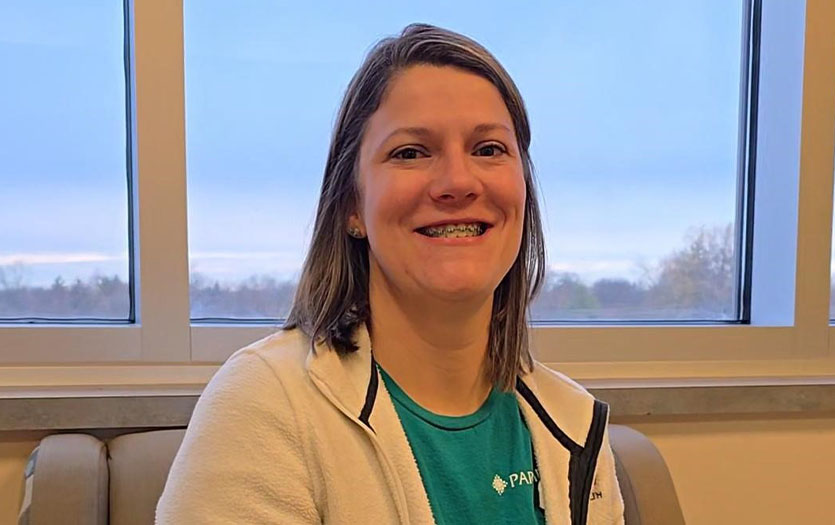
Enjoy this monthly blog post from Patrick Riecke, director, Chaplaincy and Volunteer Services.
“I’m not angry, I am just disappointed.” - Mom.
That’s the worst. Can’t she just be mad and yell at me? Unfortunately, sometimes disappointment is one of the ingredients in motherhood.
How do we face our greatest disappointments?
And I don’t mean, “Sorry, we are out of ice cream.” Not that type of disappointment. I mean, “I waited my whole life for my train to come in and now it has jumped track and is about to run over me.” That type of disappointment.
On this Mother’s Day (Hi Mom!) let me share a story with you about a very special mom with a very real disappointment—her pain, and her beautiful conclusions.
Every year, Hannah and her family made a pilgrimage to celebrate God’s goodness and to worship. They went there to thank God.
But one year it was different. Hannah wasn’t feeling it. She wanted something she didn’t have. She was facing some ultimate disappointment.
Most of us know women who have had hard times conceiving or carrying babies to a healthy delivery. Years ago, my wife and I lost our first pregnancy. Then it took 16 months before we finally conceived again. Even in today’s modern society, infertility and similar obstacles can be very painful. In fact, the CDC reports that this pain effects 7.5 million women in the United States.
Hannah faced this disappointment long before modern medicine. So, how did she explain her infertility?
She concluded that it was God’s fault.
Some of my more religious readers just got nervous. People say we can’t blame God, but that ignores the fact that it’s often God with whom we are disappointed.
Why does God withhold children from Hannah? That’s precisely her question. And it’s not a calm quiet question. Hannah’s ugly cry is on full display. She’s not going into the church to thank God like the others. Nope, she is going to stay outside and yell at God.
Her disappointment is intimate.
After blaming God, she does something else we are told not to do—she bargains with God. She tells God that she wants to be pregnant so badly that she will actually give the baby back to God if she can just have a son. She will bring him back to this place and dedicate his life to the Lord.
The surprising thing about bargaining with God is that it actually often works in the sacred stories. Hannah wants something she doesn’t have. Namely, she wants a son. She feels empty without one. She feels worthless. She is jealous of those around her who are having babies.
So, to recap:
- Hannah blames God.
- She bargains with God.
- She can’t worship because she is too disappointed with God.
I am just guessing there is a mama or two still today who can understand the place she was in at this point. But there is a clue where this story is going in the meaning of Hannah’s name.
Hannah means ‘grace’.
Now we have arrived at the key turning point in this story…
The priest comes outside the church and sees Hot-Mess-Hannah crying that ugly cry and muttering a complaint to God. And He thinks she’s drunk. He assumes this is the reason she didn’t come into the church—she’s had too much wine.
But her response to this accusation tells us what she is really thinking. When the priest tells her to stop her drinking, she wipes away her tears for a moment …
“Please, sir, don’t think I am a worthless woman!”
Please, priest of God, representative of God, don’t view me as worthless, even though that is how I am often tempted to view myself. Because if you view me as worthless, then I will have to believe my own feelings of worthlessness.
That’s actually what this is all about.
The truth is, our lack isn’t just about our lack. Our desire doesn’t just represent the thing we don’t have. It represents our lack of value. It represents our sense of worthlessness. She believes the lie that if she could just check the box marked “Children” she would feel worthwhile as a human being.
At the center of this story, then, lies the questions, “Am I worth less—is my value lower than others—because I don’t have that thing I want?”
The next verse begins the resolution, but it’s only a beginning.
It says, “The Lord remembered her.” He regarded her. He thought highly of her. He did not see her as worthless. He affirmed her value. He thought of her.
She conceives a son—it’s a miracle.
She cherishes him and probably thinks that she finally has value because she got what she wanted. But if you have ever gotten something you really wanted you know that sometimes it’s not what you thought it would be. You feel like the dog that finally caught the car. Now what?
Because after pregnancy comes motherhood. And occasionally, there can be disappointment involved when you are a mom. (I’m not mad … I’m just disappointed.) And moms know that if you tie up all your value and identity in your child, before long you will end up being right back in the place of questioning your value.
Fortunately, Hannah soon realized that her intrinsic value didn’t come from her role as a mother, as important and exciting as that may have been. I think in those three years of his infancy she found that she had value even without Samuel.
Let me say that again, and then I will explain why I believe this.
After finally becoming a mom, Hannah found that she had just as much value even when she could not have a child.
Because do you know what she did next? She fulfilled her promise. She took Samuel back to Shiloh to work for God all his life, and she left him there. Permanently.
If she really thought that all her value came from being a mom, chances are she would not have given her child up to the misjudging priest.
She discovered that her value, like gravity, is always present. Felt differently at times, but actually always constant and equally powerful.
When she arrived with three-year-old Samuel at her side, the priest didn’t recognize her. Hannah had changed. She had answered questions about her worth. She was no longer asking if she was worthwhile. She was no longer asking if she had intrinsic value. Now she could not care less what the priest thought of her value.
She knew — “I had value when I was childless. I had value while I carried the pregnancy. I have value now as a mom. And I will still have value after I walk away from this place, leaving my only son behind.”
A few years ago, I was driving down the road and my daughter, about four at the time, was in the back seat. She was making some little noises and then she asked, “Know what I’m doing, Dad?”
“Sweetie, I am sure I have no idea what you are doing.” I said.
“I’m hugging myself.” She said.
“Oh yeah?”
“Yeah, because I love myself. I really love myself. Do you love yourself, dad?”
“Um, yes? I love myself.” I replied.
“You should hug yourself, Daddy.”
It’s no secret that being a mom is one of the hardest jobs on the planet. And having to live without something that you want is an everyday reality for most moms. Maybe you want children, like Hannah. Or maybe you would just like 5 minutes without your children, like many other moms. Or maybe you just wish they would call or stop by occasionally. And you just don’t quite have what you want.
“How should I feel about myself when I don’t have what I want?”
Sometimes God helps us answer questions about our value by giving us what we want. Sometimes he gives us that answer by withholding what we want. But the answer to the question is always the same.
Mom, you have just as much value today as you did the day you were born.
You have an infinite amount of value.
You cannot add to it.
You cannot lose any of it, even for a second.
You are a child of God.
You have value because you have value.
Know what I’m doing? I’m hugging myself.
Do you love yourself?
Give yourself a hug today!



